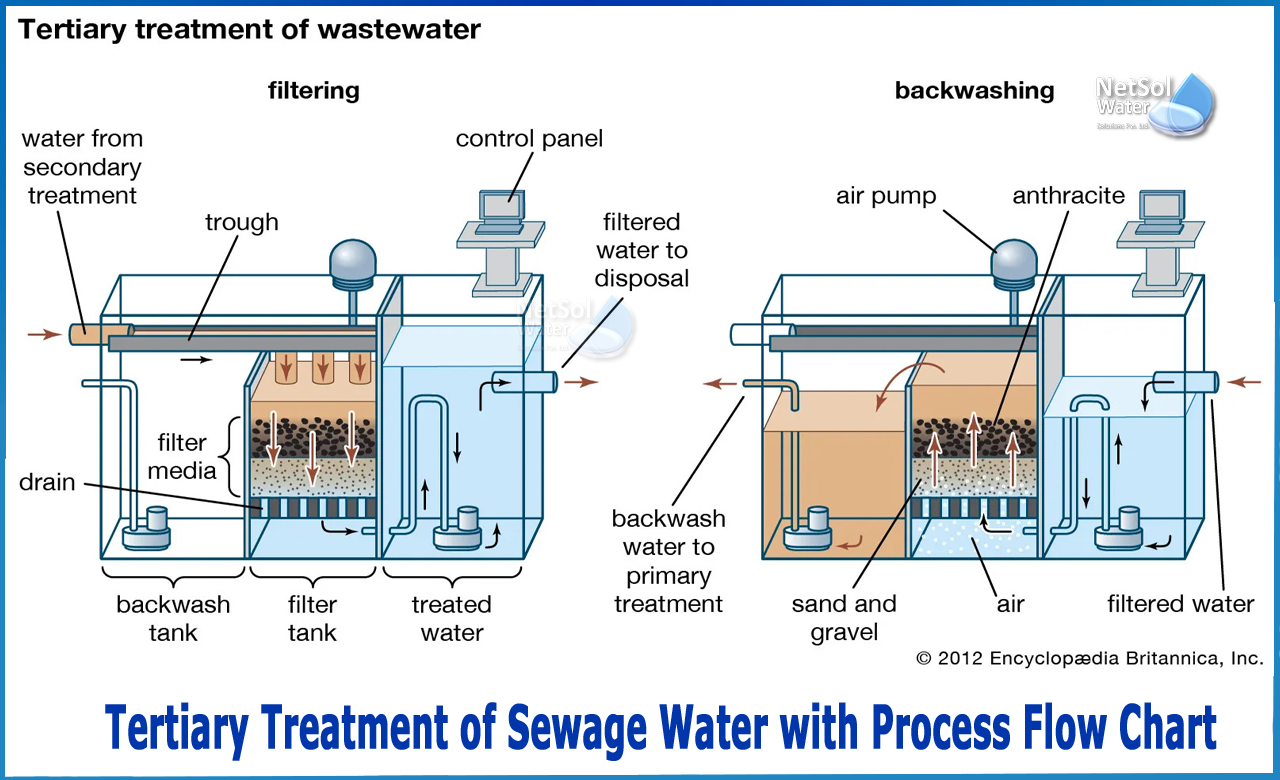What is the Tertiary treatment of Sewage Water?
Netsol Water offer tertiary treatment systems that make wastewater usable for tank washing, CIP, irrigation, and other purposes, and now-a-days, for drinking water purposes.
Tertiary treatment is the third and last stage of a conventional wastewater management system. The effluent is ready to enter the tertiary stage after it has been treated in the primary and secondary stages by removing suspended particulates, balancing the pH, and lowering the biochemical oxygen demand (BOD).
Tertiary treatment of wastewater comprises the removal of nutrients such as phosphates and nitrogen, as well as, almost all suspended and organic materials.
How does the Tertiary treatment process work?
The tertiary treatment stage of a wastewater management system prepares wastewater for ultimate use, and the extent to which it must be treated varies on the source of the wastewater and the intended application.
In most circumstances, tertiary therapy is a chemical treatment.
Chemical treatments are classified into two forms: flocculation and precipitation, since they involve distinct sorts of purifying methods. The addition of ferric ions, aluminium ions, or/and long-chained polymers to effluents provides the basis for flocculation. Due to a negatively charged surface in wastewater, which causes a repulsive force, very tiny colloidal particles cannot be removed by sedimentation.The metal ions will react with the wastewater to generate hydroxides, which will adsorb the colloidal particles via sweep coagulation and form bigger flocs that will readily settle.
For example, beverage waste streams may simply need final filtration before being used in irrigation systems such as drip systems. However, for use in CIP or tank cleaning, the effluent will need to be filtered and sterilized at the final stage. Grey water (treated wastewater) is easier to reuse than blackwater.To make final stage treatment practicable for high strength wastewater, it is vital to minimize both the organic loading (BOD) and the suspended particles (TSS) by employing treatment techniques such as reverse osmosis, disinfection, UV, etc.
Conclusion
Wastewater (and sewage) treatment is divided into three stages: primary treatment, secondary treatment, and tertiary treatment.
The tertiary treatment process is used to improve the effluent quality produced by the primary and secondary treatment procedures. Tertiary wastewater treatment is only considered required when nutrient concentrations in effluent must be lowered.
Following tertiary treatment, the water may be safely released into the environment (such as rivers and lakes) and utilized for agricultural, industrial, and, in many cases, household uses.
What can we offer?
Netsol Water is a large water and wastewater treatment company in India that manufactures WTP, WWTP, STP, ETP, Industrial & Commercial RO Plants, among other services. It has become our job to rescue the earth. The firm manufactures equipment’s and is dedicated to offering practical solutions that enable businesses to thrive.
Netsol Water is Greater Noida-based leading water & wastewater treatment plant manufacturer. We are industry's most demanding company based on client review and work quality. We are known as best commercial RO plant manufacturers, industrial RO plant manufacturer, sewage treatment plant manufacturer, Water Softener Plant Manufacturers and effluent treatment plant manufacturers. Apart from this 24x7 customer support is our USP. Call on +91-9650608473, or write us at enquiry@netsolwater.com for any support, inquiry or product-purchase related query.



